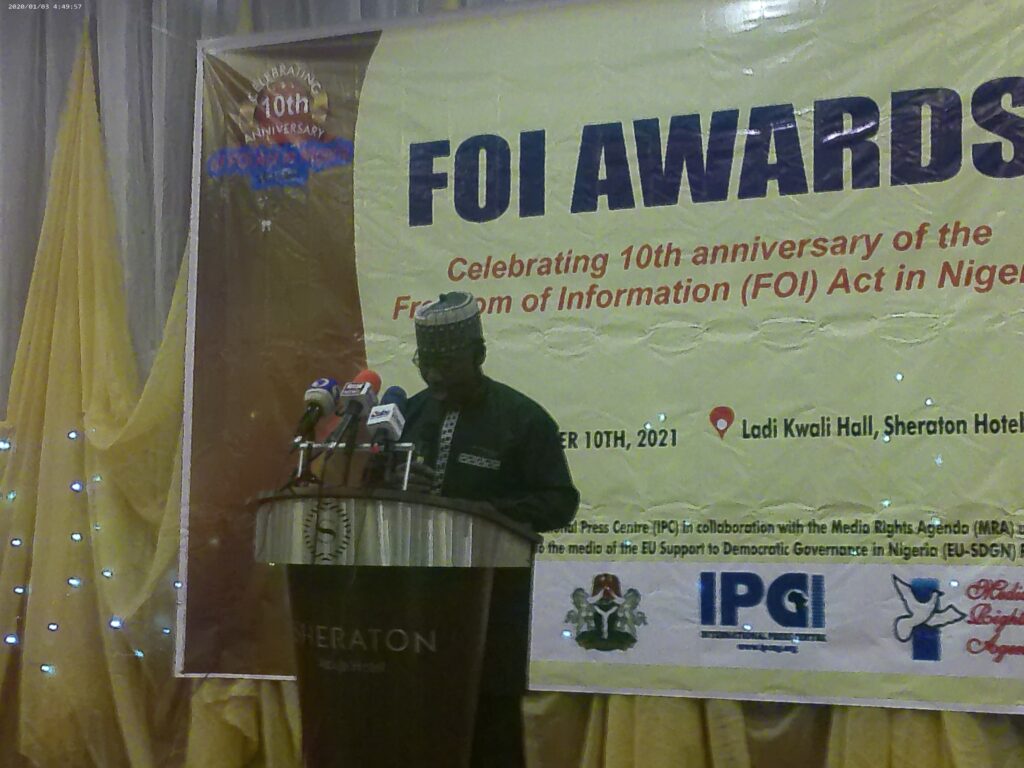The Freedom of Information (FOI) Act, 2011 has recorded tremendous progress over the last 10 years, despite the challenges of implementation confronting the Law, according to Mr. Lanre Arogundade, Executive Director of the International Press Centre (IPC) in Lagos
Mr. Arogundade made the assessment in a welcome address he delivered on behalf of IPC and Media Rights Agenda (MRA) at the National Freedom of Information Awards ceremony organized by the two organizations in Abuja on December 10, 2021 in commemoration of the 10th year anniversary of the signing of the FOI Bill into Law by then President Goodluck Jonathan in 2011.
Addressing a multi-stakeholder audience of about 140 awardees and guests at the ceremony, drawn from government institutions, civil society organizations, the National Assembly, the media, members of the legal profession, academics, and students of tertiary institutions, among others, he said a decade after President Jonathan signed the bill into Law, “I am happy to stand before you to say tremendous progress has been made, yet there are opportunities for more to be done using the FOI.”
Mr. Arogundade noted that despite the challenges of implementation both on the supply side, namely the government, and the demand side, namely members of the public, the organizers were convinced that the 10th year anniversary “is a milestone worth celebrating, more so as the occasion also affords us the opportunity to take stock and strategise on improving the implementation and usage of this important law in the years ahead.”
He recalled that although Nigeria was under the jackboot of military dictatorship in 1993, that fact did not deter MRA, the Civil Liberties Organisation (CLO) and the Nigeria Union of Journalists (NUJ) from “plotting” to have the FOI instituted in the country.
Mr. Arogundade described the idea as a vision born out of optimism that Nigeria would one day shrugged off military shackles and welcome a future civil dispensation, where an access to information law would be required as catalyst for accountability and transparency, which are the core elements of good governance.
He recounted that FOI meetings of that period were held discreetly and that seven years later, when in 1999, Nigeria returned to civil rule, the organisations behind the FOI initiative wasted no time in handing over the bill to the newly elected President Olusegun Obasanjo in the expectation that he would accept to sponsor it as an executive bill to ensure speedy passage.
Mr. Arogundade regretted that this was not to be as President Obasanjo “simply returned the ‘FOI letter’ back to sender!”
According to him, a 12-year journey then ensued because there was a strong army of opposition, both within the executive and legislative arms of government, necessitating a strategic response with the formation of the Freedom of Information Coalition through which diverse interest groups, including businesses, chambers of commerce, medical practitioners, legal practitioners, academics, trade unionists, journalists, editors and publishers, among others, enlisted in the growing army of believers in FOI.
Mr. Arogundade said despite virulent opposition, there were men and women of courage in both the Senate and the House of Representatives, who stood firm and shared the FOI vision with the media and the civil society.
He identified some of them as Hon. Abike Dabiri-Erewa, Hon. Jerry Ugokwe, Hon. Abdul Oroh, Senator Victor Ndoma-Egba (SAN), and Senator Ayogu Eze, “who all stood to be counted.”
Continuing the narration, Mr. Arogundade said on May 28, 2011, the vision of the prime movers became a reality and history was made when President Jonathan courageously signed the FOI bill into Law, after it had been passed by the National Assembly a second time as the first time the bill was passed by the National Assembly in 2007, then President Olusegun Obasanjo famously declined to assent to it.
That history, he added, birthed others as Ekiti State under Governor Kayode Fayemi made history by becoming the first state in Nigeria to have an FOI law and at least one other State has joined the league.
Mr. Arogundade thanked Governor Fayemi “for blazing the trail as a leading light” and commended the vision and enormous sacrifice of all those who played active roles in the 12-year struggle including the leadership of the Nigeria Union of Journalists (NUJ), the Nigerian Guild of Editors (NGE) and the Newspaper Proprietors Association of Nigeria (NPAN).
He also acknowledged “the immense support of media organisations and individual journalists who contributed in no small measure towards bringing FOIA into reality.”
Mr. Arogundade apologised to those deserving of honours but have been left out of the current edition, saying “This is just the beginning, and in future there will be many more recognitions and you will be on the list.”
He congratulated the current award winners and expressed the hope that “this gesture will encourage state institutions to do better in proactively disclosing information, and heeding FOI requests. We also expect this to spur the citizens, especially journalists and civil society activists to utilise the FOI Act the more.”
Mr. Arogundade also thanked the European Union for making the awards ceremony possible through the its Support to Democratic Governance in Nigeria (EU-SDGN) project.







